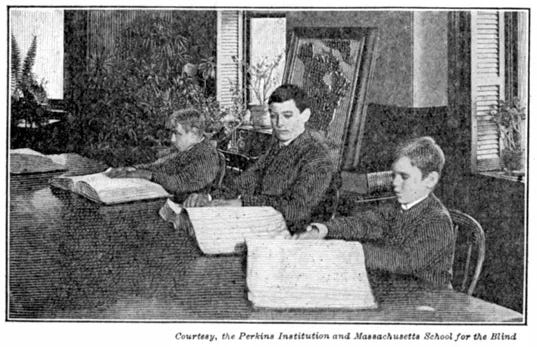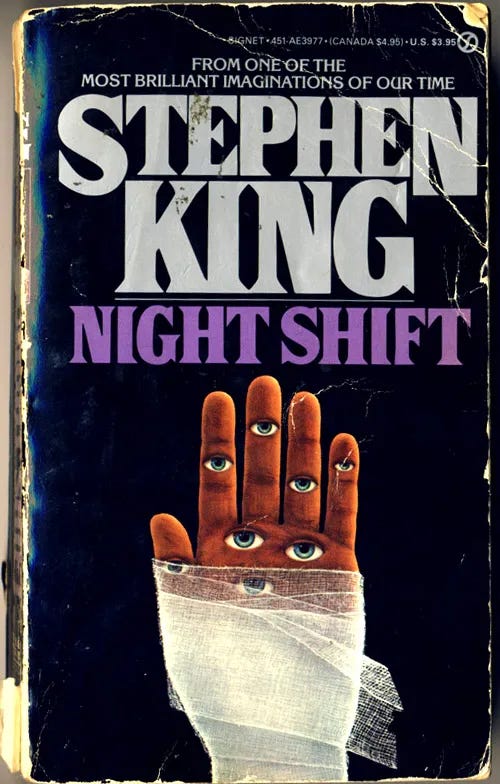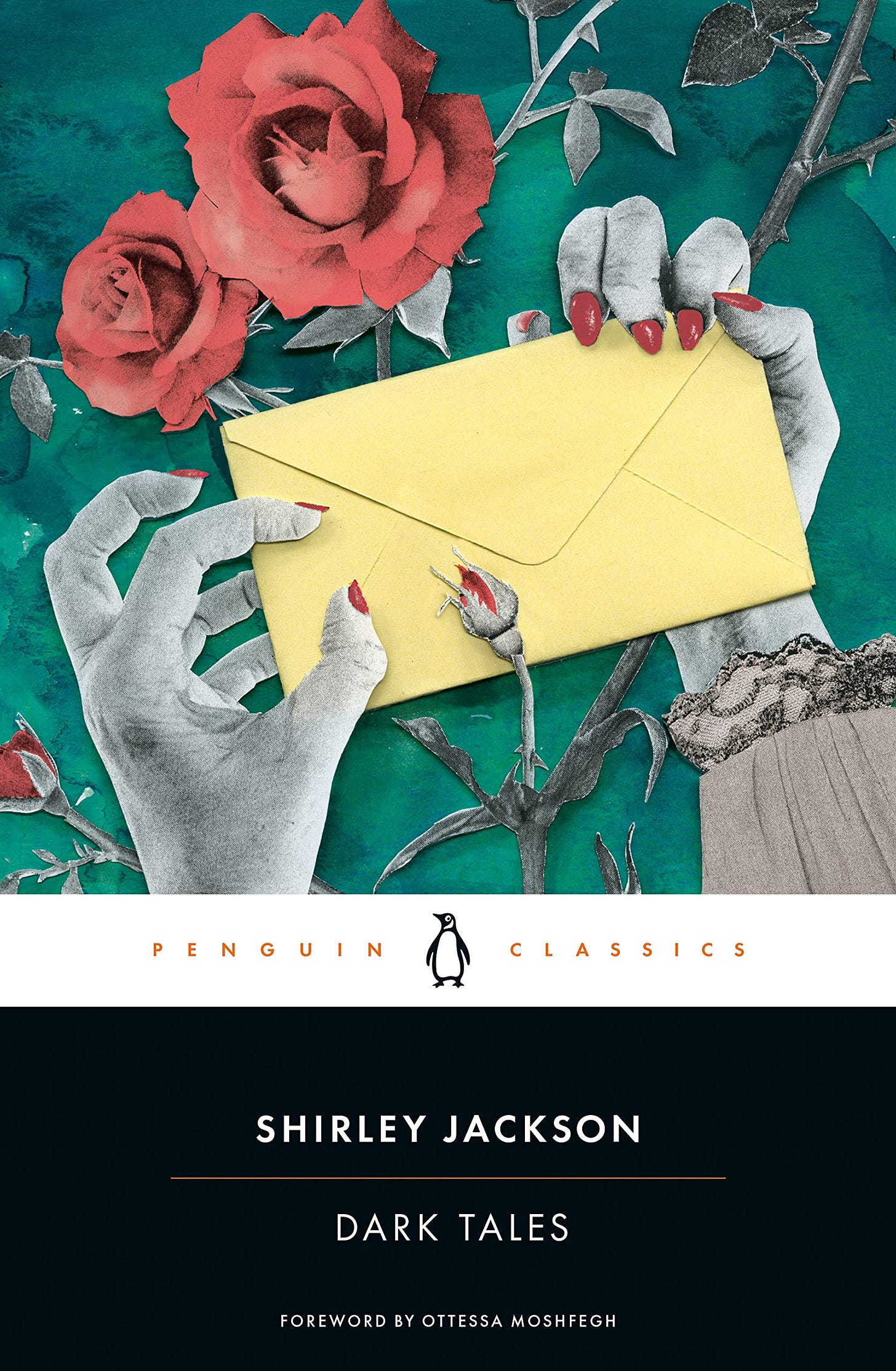Books read:
Night Shift, Stephen King
Dirtbag Massachusetts, Isaac Fitzgerald
Books reading:
Nicholas Nickleby, Charles Dickens
The Mists of Avalon, Marion Zimmer Bradley
Dark Tales, Shirley Jackson
Kaputt, Curzio Malaparte
I warned you. I told you it would come to this. I am, at best, a fairweather reader — sometimes I mill through books like a literate woodchipper; sometimes my to-read and currently-reading stacks gather enough dust to inspire the most stolid Okie to pack up and head west.
Yes, I’ve been reading (or rather, not been reading) Marion Zimmer Bradley’s feminist opus The Mists of Avalon for going on three months and I’ve not progressed much since last we met. I’m not sure I like it very much, to be honest. I appreciate the general conceit — a retelling of the Arthur myths through the perspective of the often-sidelined women characters — but I’m not sure I love the execution. I find it to be kinda plodding, actually. I’m not sure if I’ll stick with it, but since I haven’t resolved to abandon it, it will remain on the “books reading” list until such time I do.
But let’s return to the things I did read.
There was a bit of a ghost story/horror movie kick happening in our household over the last month or so. Not sure what to attribute that to, other than my new book, The Stars Did Wander Darkling, came out in September and I’ve spent the last month or so talking about all things horror in bookstores and classrooms around the country. I’ve been in a very scary frame of mind. As a consequence, Carson and I watched several excellent horror movies in the last month or so: The Innocents and Barbarian come to mind, both of which are streaming. We also took in a great documentary on folk horror called Woodlands Dark and Days Bewitched, which I have only just now referred to by its actual title rather than That Folk Horror Documentary. It’s three hours long and pretty exhaustive. If you’ve seen it and are curious if someone has compiled all of the movies mentioned in the film, well, the internet doth provide.
Anyway, with this in mind, I returned to the boxed set of Stephen King novels I’d bought off of eBay when I started working on Stars. It’s one of those mass market box sets from the early eighties; this one has Carrie, Pet Semetary, and Night Shift. Of course, I’m sure I could’ve patronized my local bookseller and found perfectly adequate used copies of the new editions of these books, but I find the new covers to be god-awful. I needed those 1980s versions, with the author’s name in just the right typeface, because I am a sentimental fool. I’d re-read Carrie and Pet Semetary, but never got around to Night Shift; I did this now.
It was…it was fine. Maybe because it’s a collection of short stories, I found I couldn’t recollect whether I’d read this one as a kid or not. Some of the stories were familiar; many were not. Some were pretty good; a bunch of them were not so good. But when they are good, they are very good at what they set out to do — namely, to be scary. “The Children of the Corn” is a stone cold classic. So is the Salem’s Lot outtake that kicks off the collection, “Jerusalem’s Lot.” One thing, though, that I discovered as I read these stories — and it’s something that confirmed my memories of reading King as a kid — they’re all pretty well shot through with misogyny. The male characters (and they’re mostly male characters) seem to all struggle with anger issues — and so much of that anger is directed toward women. Resentment of women. Outright hate of women. It’s weird! Maybe King’s tone has changed since then — but man if it isn’t everywhere in his early novels and stories. I remember that rankling me even as a kid, and it’s one of the reasons why there should be more King alternatives for middle grade readers.
In keeping with this thread, I also picked up Shirley Jackson’s short story collection, Dark Tales, from a stack that had been loitering on a table in our living room for some time. Jackson has had a moment — several moments it seems like — over the last few years and I’m admittedly late to the trend. I like her stuff — it’s got a nice quality of being just ever so slightly off-putting, a voyage into peoples’ darker sensibilities. I’ve always got whiffs of Southern Gothic from Ms. Jackson, though Google tells me she was a northerner all her life. American Gothic, I suppose. Good stuff.
I finished Isaac Fitzgerald’s Dirtbag Massachusetts shortly after last month’s edition of the Reading Room, and I really liked it! Isaac writes about himself with a refreshing candor, a skill that’s very enviable. The loose-knit essays in the book, while not carrying a through-line so much, create a captivating portrait of a guy from a modest background finding his way in the world. I recommend it! He’s also a very kind and generous person in real life, you should know, in case you run into him in a dark alley or something. Don’t let the finger tattoos fool you.
Nickleby proceeds apace — a few drives to Astoria in the last month have afforded me a little Vance-Reads-Dickens-To-Me time. I’m close to the finish line and I have to say: this novel is getting more scattershot as it goes along. I mean, scattershot is part of the Dickens game, I suppose, but I feel like in other books he tends to land narrative threads a little better. Here I am, within spitting distance of the end, and I’m getting the sense that certain dramatic intrigues started in the earlier pages are just not going to get resolved. Plus, random intrigues and characters keep getting introduced while others fade away into the background. It rankles that the two major dust-ups in the book between our hero, “Knuckles” Nickleby, and various villains never amount to anything of consequence. Squeers nearly loses an eye and Hawk lands in the hospital, all from Nickleby’s aggressions, and our hero gets away scot-free each time. One gets the feeling, reading it, that Dickens lost interest in several of the avenues he pursued and just abandoned them. That’s my read, anyway. Dickens scholars and Nickleby-enthusiasts come at me!
Curzio Malaparte’s Kaputt has been languishing on our bookshelf for a while now — I’ve picked it up and put it down more times than I can remember. As with most World War Two memoirs/nonfiction, it’s a hard read. It’s got a fascinating back-story, though: Malaparte, a correspondent for a newspaper in Italy, wrote the manuscript in German and Russian occupied Europe, always having to hide the pages in the walls of pig sties and in the lining of his jacket and things whenever the Gestapo would come and kick him out of the country. It’s a lot of first-hand observations of Europe at a time when everything was coming unraveled — tales of front-line devastation, a record of a terrorized population. Particularly fascinating is the writing about the European aristocracy and how it holds up (or rather, disintegrates) in the wake of a kind of societal collapse.
How ‘bout you? What books are you busily sewing into the hemlines of your overcoats these days?











Have you ever seen the 1980s nine-hour-long Royal Shakespeare Company Nicholas Nickleby with Roger Rees? It may be hard to get a hold of online (I'm not sure – I've owned the DVD box set since I was a kid)... But I would BEYOND HIGHLY recommend it. I'm a theater-maker, so perhaps I'm a little biased, but Nicholas Nickleby is, no joke, one of the reasons I became one. I feel like it does such a good job at bringing out the best parts of the novel, nailing the humor and the pathos, and making both Dickens's caricatures and his human beings sing. And Roger Rees (despite being, like, 38 and playing 19-year-old Nick!) is so astonishing: His performance, I think, brings home the moral thrust of the novel in a way that maybe even Dickens himself—what with the full-blown picaresque-ness of his early stuff—maybe doesn't quite pull off. I feel like in Rees, what you see is this huge-hearted, young idealist who so believes in the existence of goodness and rightness, and is so affronted when he encounters a world that largely runs on anything but. His outbursts of violence are practically symbolic — it's his/our/the author's moral indignation breaking out of the character physically. And while maybe that's not actually, ultimately, The Way, we can't help but be with him. Part of us also wants SOMEONE to take down the Squeerses and Hawks of the world, right? I think Dickens got more sophisticated about the expression of this same kind of moral outrage at the cruelty and greed of the world as his books went along. There's something young and overly cathartic about Nicholas's aggro moments, but they're also so bound up with the heart of Dickens's project as a social/ethical novelist...
Also, Edward Petherbridge's Newman Noggs is one of the most fantastic performances... like, ever. If you have nine hours to spare, it's truly phenomenal <3
I just finished POISON FOR BREAKFAST after seeing it in your last post and loved it.